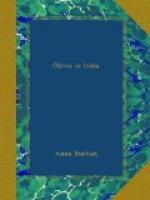After dinner we said good-bye to our friends in what Boggley irreverently calls “the hash-house,” and at nine o’clock departed to the station. The bearer was there with all the luggage, and the syces with the ponies, for we are taking the ponies in case there is a chance of polo. In the end we nearly missed the train. At the booking-office, when we tried to book the ponies, the babu in charge lost his presence of mind and turned round and round like a teetotum. I was amazed at Boggley’s patience. For myself, I was conscious of an intense, and most unladylike, desire to slap the poor babu. I, who have constantly protested against any want of consideration in the treatment of natives!
As I was the only lady travelling, the guard was much against giving me a carriage to myself, but a man who spoke with authority, hearing us argue, came up and told him to put a “Ladies Only” placard on my carriage, so I travelled in lonely splendour.
At Assansol, which we reached at 5 a.m., we had chota-hazri. Tea and toast, and most diminutive eggs, which we had to hold in our fingers as there were no egg-cups.
Simultala was my destination, and about eleven o’clock we reached it. Underneath the trees a few yards away from the little station we found a bullock-cart, which the Russels had sent for my luggage, and a doolie for myself. A doolie is a kind of string-bed hung on a pole, with a covering to keep off the sun. It is carried by four men, and two others run alongside to relieve their companions at intervals. I had sixteen miles to travel in this thing. I looked at Boggley very doubtfully, and he tried to encourage me.
“It is really quite comfortable,” he said (and when he said so he lied), “and the men go very fast. You will be there in no time.” So I bundled in somehow, said a wistful good-bye to Boggley, and we started. I can’t honestly say I like a doolie. I would rather have been my luggage and gone in the bullock-cart. Whichever way I lay I very soon got an ache in my back. The conduct, too, of the coolies filled me with uneasiness. They kept up a continued groaning. One said, “Oh—oh—oh!” and the other replied, “Oo—oo—oo!” and you can’t think what a depressing sound it was. (I know now that doolie-coolies always make that noise when on duty. It seems to keep up their hearts, so to speak, and cheer them on.) Feeling guiltily that it was my weight that made them groan, I lay perfectly still, and was even holding my breath in an effort to make myself lighter, when, for no apparent reason, we left the road, such as it was, and started across the trackless plain. There was nothing to be seen except an infrequent bush, no trace of a human habitation—nothing but the wind blowing and the grass growing. Awful thoughts began to come into my head. I was all alone in India, indeed worse than alone, I was in the company of six natives most inadequately clothed: of their language I knew not one single word; I didn’t




